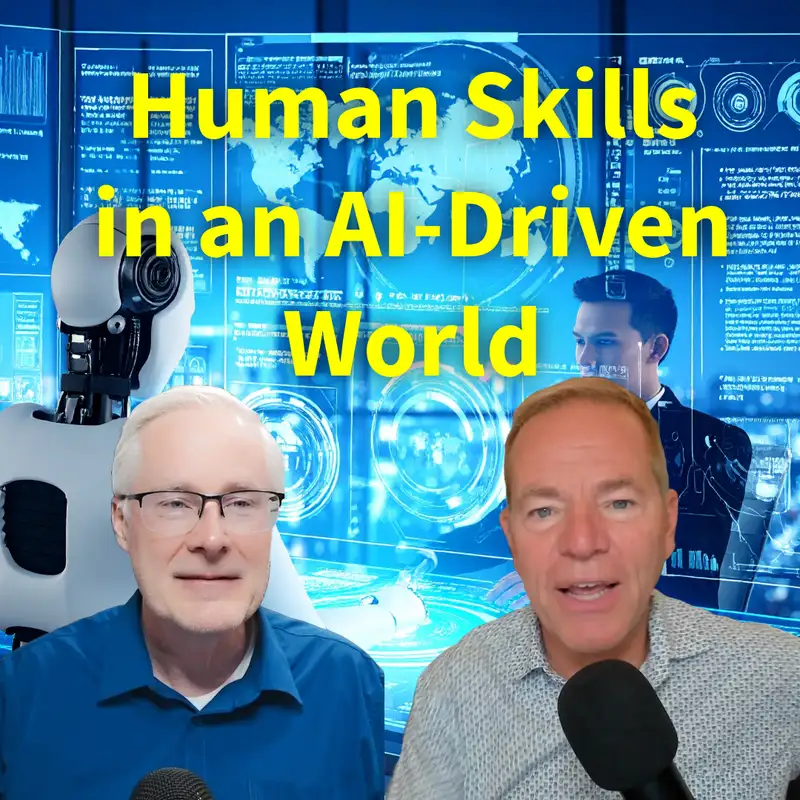#267 The Future of Skills in an AI-Driven World
In this episode, Dr. Darren interviews Kevin Surace, who shares his journey from being a technology enthusiast in upstate New York to becoming a pioneer in AI virtual assistants. He discusses the evolution of AI, the challenges faced in the early days, and the current landscape of generative AI. Kevin emphasizes the importance of adapting to AI innovations in the workforce and the potential impact on jobs, particularly in customer support and manual testing roles. He reflects on the need for strategic roles as technology advances, highlighting the value and integral role of individuals in shaping the future workforce. He also discusses the loss of valuable skills in the workforce. In this conversation, Kevin Surace and Darren Pulsipher explore the implications of technological advancements, particularly generative AI and humanoid robots, on skills, workforce dynamics, and the future of various industries. They discuss the loss of traditional skills, the convenience factor driving technology adoption, and the emerging skills gap in the workforce. ## Takeaways * Kevin Surace's background in technology and music shaped his career. * He was involved in the early development of AI virtual assistants. * Experience in the workforce is crucial for success. * Generative AI is now widely used, even in education. * The first virtual assistant was built in the late 90s. * AI is poised to replace tier-one customer support jobs. Manual testing roles are at risk due to advancements in artificial intelligence. * Adaptation to AI is necessary for job security. * The cost of technology drives productivity and market growth. * Valuable skills, like those of a good secretary, may be lost. Knowledge is disappearing as technology advances. * Generative AI can create content at unprecedented speeds. * The value of traditional skills is diminishing in the workplace. * Humanoid robots may revolutionize home and work environments. * Convenience drives technology adoption and changes consumer behavior. * Generative AI is changing the landscape of programming. * The skills gap is widening as entry-level positions diminish. * Investing in workforce development is crucial for the future. * The trades are becoming increasingly valuable in a tech-driven world. * Automation will not replace all jobs, especially in complex tasks.
In today's rapidly evolving digital landscape, understanding how artificial intelligence (AI) will reshape job roles and industries is crucial for professionals. As more businesses adopt generative AI and machine learning, it’s vital to comprehend the implications of these technologies on the workforce and the skills needed for the future. Let’s explore how the integration of AI is transforming the workplace and what this means for professionals across various sectors.
The Evolution of Job Functions
As AI technology advances, traditional roles are being disrupted and transformed. This shift presents a unique opportunity for professionals to engage in more strategic roles that leverage their critical thinking and problem-solving skills. The gradual automation of routine tasks, once the purview of administrative assistants, customer support agents, and manual testers, is now being performed by AI systems. For instance, tier-one customer support is set to be heavily influenced by AI chatbots that can efficiently handle inquiries without human intervention. This transformation is not about reducing the number of jobs, but about redefining how work is performed, offering a hopeful outlook for the future.
This transformation is not just about job reduction; it’s about redefining how work is done. Instead of focusing on repetitive, low-value tasks, professionals must adapt by taking on more strategic roles that utilize their critical thinking and problem-solving skills. This evolution underscores the importance of continuous learning and upskilling to stay relevant and competitive in an AI-driven environment.
Emphasizing Soft Skills and Strategic Thinking
With the rise of AI automation, soft skills are becoming increasingly essential for professionals. As AI takes on more transactional tasks, human workers are expected to bring emotional intelligence, collaboration, and complex decision-making to the table. This convergence of technical and interpersonal skills will be critical, allowing workers to thrive in a world where AI supports rather than replaces them.
Furthermore, industries should foster an organizational culture that encourages adaptability and flexibility. Companies must invest in training programs that help employees build these soft skills, alongside technical competencies. By doing so, organizations can prepare their workforce for the future and ensure that employees are better equipped to work alongside AI technologies.
Navigating the AI-Driven Workforce Landscape
To effectively navigate the implications of AI in the workplace, it's crucial to approach the landscape with a growth mindset. Leaders and professionals need to remain open to new tools and methodologies that enhance productivity and efficiency. This means being proactive in exploring how AI can augment existing processes and workflows, ultimately driving operational improvements.
Additionally, businesses should stay informed about emerging technologies and their potential impact on their operations and the industry. Engaging in innovation strategies, collaborating with tech developers, or participating in workshops on AI applications can significantly bolster an organization’s adaptability and resilience in the face of disruptive changes.
Embracing Change in the Wake of AI
As AI continues to evolve and permeate various aspects of work life, professionals and organizations alike must embrace change. The future of work lies in an ecosystem where humans and AI co-exist, empowering one another to achieve greater outcomes. By focusing on developing new skill sets, enhancing interpersonal capabilities, and fostering a culture of innovation, individuals and businesses can thrive in the AI-driven landscape.
To find out more about these insights and strategies, consider exploring resources on AI applications and workforce transformation. Remember, the key to success in the digital age is active engagement with technology and a commitment to lifelong learning.

